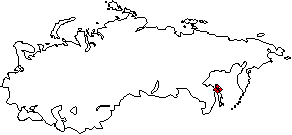CONTENTS
IntroductionForeword
Language Groups
Tribes and Dialects
Order the book
The Peoples
of the Red Book
Abazians (Abaza)Abkhaz
Aguls
Akhvakhs
Aleuts
Altaics
Aliutors
Andis
Archis
Asiatic Eskimos
Bagulals
Baraba Tatars
Bartangs
Bats
Bezhtas
Botlikhs
Budukhs
Central Asian Jews
Chamalals
Chukchis
Chulym Tatars
Crimean Jews
Crimean Tatars
Didos
Dolgans
Enets
Evens
Evenks
Georgian Jews
Godoberis
Hinukhs
Hunzibs
Ingrians
Ishkashmis
Itelmens
Izhorians
Kamas
Karaims
Karatas
Karelians
Kereks
Kets
Khakass
Khants
Khinalugs
Khufis
Khvarshis
Kola Lapps
Koryaks
Kryz
Kurds
Lithuanian Tatars
Livonians
Mansis
Mountain Jews
Nanais
Negidals
Nenets
Nganasans
Nivkhs
Nogays
Orochis
Oroks
Oroshoris
Peoples of the Pamirs
Roshanis
Rutuls
Selkups
Shors
Shughnis
Tabasarans
Talysh
Tats (Tatians)
Tindis
Tofalars
Trukhmens (Turkhmens)
Tsakhurs
Udeghes
Udis
Ulchis
Veps
Votes
Wakhs
Yaghnabis
Yazgulamis
Yukaghirs
visit the guestbook or mail comments to the webmaster

THE OROKS
Habitat. The Oroks live in the northern part of Sakhalin Island in the Sea of Okhotsk, and in the Poronai District in the south of the island. They live alongside the Nivkhs.
Population. There is little information concerning the population for not all censuses have registered the Oroks as a separate people:
| 749 (304 in the north, 445 in the south) | |
| 1926 | about 460 (162 in the north) |
| 1960 | the South Orok: 160--170 |
| 1989 | 190 |
Anthropologically, the Oroks are pure Mongoloids belonging to the Baikal or Paleo-Siberian group like the Nanai, the Even and the Evenk people.
The language belongs to the Southern Group of the Manchu-Tungus languages. It is most closely related to the Nanai and Ulchi and shares features common with the Evenki and Negidal languages of the Northern Group.
History. The Orok oral tradition has references to a continental origin, re-settlement on the island, and reindeer-breeding in the past. Probably the migration took place in the 17th century at the latest, from the area of the River Amgun. In Russia they were first studied by N. Boshnyak in 1852.
Ethnographically, the Oroks are close to the Orochi and the Ulchi, yet differing from them sharply in regard of their economy based on reindeer-breeding. Their attachment to the reindeer has even given occasion to regard them as an Evenki subgroup. Fishing has also shaped the Orok mode of life -- to adjust themselves to this occupation they had to modify their nomadic habits to an extent compliant with its more stationary demands. Hunting wild and sea animals was also practised. The relatively restricted mobility of the Oroks resulted from the need to stay close to the fishing grounds in summer. In spring the reindeer and winter tents were left behind in the taiga and the people settled on the coast or near an estuary. From there they moved upriver in autumn to catch more fish and gather the reindeer. In the 1920s the North-Sakhalin Oroks were divided into five groups, each with their more-or-less established migratory zone. A peculiar habit of the Oroks was their regular visits to the continent to attend the Puli fair by the River Amur. By the Amur they used to meet the linguistically-related Ulchi who were the only people to call the Oroks ul'cha or ol'cha, that is, by their own name. On Sakhalin the Oroks were in close proximity to the Ainu, the Nivkhs and the Evenks, who had settled there in the 19th century and were also breeding reindeer.
The North-Sakhalin Oroks joined the collective farm Val, established in 1932 and specialized in reindeer-breeding. The farm also contains Nivkhs, Evenks and Russians. Russian-type log cabins are the main form of dwelling. Only the herdsmen lead a nomadic life. Vegetable-farming and cattle-breeding are the new occupations gaining ground. Hunting sea animals and fishing are of relatively modest importance.
The South-Sakhalin Oroks live in the villages of Rechnoye (formerly Naiputu) and Ustye near the town of Poronaisk. Formerly, they lived in the taiga but having liquidated their herds for economic reasons, they settled on the coast and took to fishing at the turn of the century. Until 1945 this part of the island belonged to Japan. According to estimates, there were about 160--170 Oroks living there in 1960. The Oroks inhabit villages of standardized dwellings, shared together with Nanais, Nivkhs and Russians. The main occupation is fishing but there are also people employed in industry. Only a few items, mainly clothing and fishing gear as well as some commodities made of birch bark, have been preserved from the old ethnic culture. The Oroks have no written language. Children are educated in Russian, usually they study at boarding schools together with Nivkh, Nanai and Evenk children. There is no organised cultural activity though to some extent amateur art is practised in the local clubs together with the Nanais and Nivkhs. No precise data exists concerning the standing of the native language. Knowledge of Russian is universal, nurtured by school and by living in close communion with other peoples. In the 1959 and 1979 censuses the Oroks were not registered. The ethnographer Z. Sokolova mentions in the journal Soviet Ethnography (6, 1990) the fact that the population of the Oroks and Orochi has decreased by 7.7% in the ten years between 1979 and 1989. Despite a lack of any nationalist organisations, N. Solovyov participated in the work of the Congress of Northern Ethnic Minorities, held 30--31 March 1990 in Moscow, as the representative of the Orok people.
REFERENCES
- Ороки. -- Народы Сибири, Москва -- Ленинград 1956
- Т. Петрова, Язык ороков (ульта), Москва 1967
- А. В. Смоляк, Южные ороки. -- Советская этнография 1, 1965
- А. В. Смоляк, Этнические процессы у народов Нижнего Амура и Сахалина, Москва 1975
IT